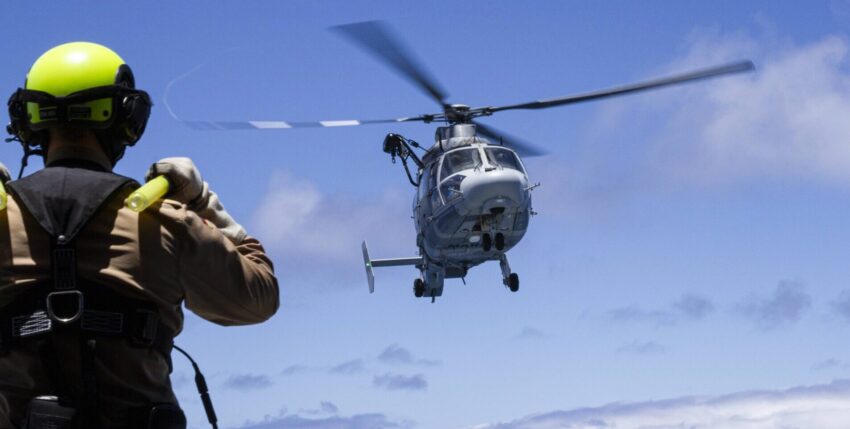From a press release by the Rostock Naval Command:
At sea - During the night of 21 to 22 June German time, the ship's doctors on the task force provider "Frankfurt am Main" took a sick person on board between the US mainland and the Hawaiian archipelago, around 1,400 kilometres off the Californian coast, and provided him with emergency medical care.
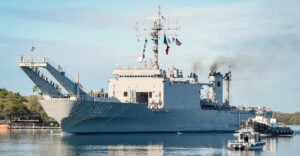
How did it come about
A German Navy unit consisting of the frigate "Baden-Württemberg" and the task force supply ship "Frankfurt am Main" is currently in transit from San Diego, California, to Hawaii as part of the Indo-Pacific Deployment (IPD) 2024 with six other naval vessels from four nations. After a medical emergency was diagnosed in a Mexican marine soldier on the Mexican supply ship "Usumacinta", which is also currently part of the association, an ongoing supply manoeuvre between the frigate "Baden-Württemberg" and the task force supply ship "Frankfurt am Main" was aborted in order to ensure that the patient was admitted and received appropriate medical care as quickly as possible.
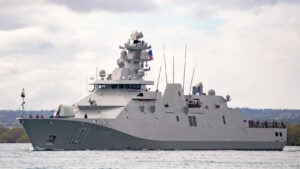
How does something like this
The 24-year-old patient was first flown by the on-board helicopter of the Mexican frigate "Benito Juárez" from the Mexican supply ship "Usumacinta" to the German task force supply ship "Frankfurt am Main". There he was operated on in the already prepared operating theatre of the "integrated Marine Emergency Rescue Centre" (i-MERZ) on board. The operation went smoothly and according to plan; the patient's condition is stable.
A matter for the boss
"This example clearly shows how well international cooperation at sea and teamwork within the organisation works," says Flotilla Admiral Axel Schulz (53), commander of the German IPD task force, and emphasises: "I am proud of the fast and highly professional work of all the comrades involved and wish the patient a speedy and full recovery."
Continue as planned
Meanwhile, the association continues its transit towards the Hawaiian Islands and will reach its next port of Honolulu on 27 June. After a preparatory phase lasting several days, the two German naval vessels of the IPD will take part in the largest maritime manoeuvre in the world, "Rim of the Pacific" (RIMPAC) under US command.
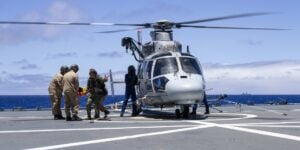
Integrated Marine Emergency Rescue Centre (i-MERZ)
The new iMERZ is a small floating hospital. It has two operating theatres, a ward, an X-ray room, laboratories, a central sterilisation unit and a dental technology department. This state-of-the-art equipment enables emergency surgical care to be provided at any time with urgently needed operations on the high seas. At the same time, it replaces the container solution previously used on the task force supply vessels of the Marine.
The Indo-Pacific Deployment 2024 so far
The German Navy's IPD 2024 began with the departure of the two ships on 7 May. The task force provider "Frankfurt am Main" departed from Wilhelmshaven and the frigate "Baden-Württemberg" from Rota in Spain. The ships first met in the North Atlantic before making their first stop in Halifax, Canada. The convoy then travelled to New York City for the US Navy's Fleet Week.
After four days, the journey continued, first along the east coast of the USA, then through the Caribbean and the Panama Canal. In the last port of call in San Diego, USA, a crew change took place on the frigate "Baden-Württemberg". The crews used every day at sea for intensive training and further preparations for upcoming tasks.
The security policy background
The Indo-Pacific Deployment (IPD) is the German Navy's most important project in the context of defence diplomacy and enhanced security cooperation in 2024. For seven months, from May to December, the German naval forces will fly the flag worldwide with a task force consisting of two ships: the frigate "Baden-Württemberg", supported by the task force provider "Frankfurt am Main". This year's IPD, like the Navy's previous deployment in 2021, will once again demonstrate Germany's commitment to free and secure sea lanes, a rules-based international order and enhanced maritime security cooperation. In addition to harbour visits to strategic partners, the two German ships will take part in several exercises with one or more partner nations.
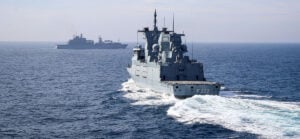
RIMPAC 2024
One highlight is the US-led exercise RIMPAC 2024, in which around two dozen navies are taking part. In addition, the frigate "Baden-Württemberg" and the task force provider "Frankfurt am Main" will not only be operationally involved in monitoring the UN sanctions against North Korea, but will also contribute to the EU's coordinated maritime presence in the north-west Indian Ocean. In summary, IPD 2024 is an important maritime defence diplomacy project that includes a wide range of naval exercises with international partners and participation in various operations.

